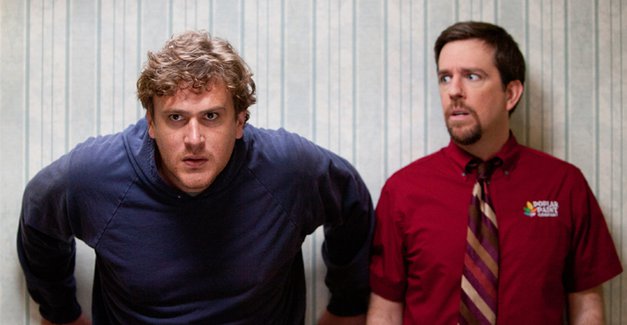In Woody Allen’s “Midnight in Paris,” the young writer Gil asks Ernest Hemingway if he would offer an opinion on the book he’s writing. “My opinion is I’ll hate it. If it’s bad, I’ll hate it because I hate bad writing, and if it’s good, I’ll be envious and hate it all the more. You don’t want the opinion of another writer. Writers are competitive.” It’s not a real Hemingway quote, but it feels like one, and it gets at the dilemma of another great writer, David Foster Wallace.
In “The End of the Tour”, Director James Ponsoldt (“Smashed”, “The Spectacular Now”) documents the last few days of Wallace’s book tour for his American literary classic “Infinite Jest”. Rolling Stone reporter David Lipsky planned to spend a few days with Wallace and pick his brain, but the two are each insecure and in awe of the other. Their competition and their conversation gets the better of them, and in their pursuit to tell a good story, they realize they’ve created more conflict than this story deserves.
Ponsoldt’s film might be the best movie about writing since “Almost Famous”, and it avoids the trap of actually being forced to sit through the tedious visuals of writers writing. Jason Segel is wonderful as Wallace, and “The End of the Tour” recognizes that the best writing isn’t always about the story itself, but the details.
Ponsoldt opens the film with Lipsky (Jesse Eisenberg) learning of Wallace’s suicide in 2008, acknowledging that there’s a hint of grief and pain hanging over Wallace’s character and why Lipsky feels in part responsible. It then flashes back to 1996, shortly after “Infinite Jest” was first released. Lipsky picks up Wallace’s book, and like the writer he is proclaims, “Shit”, at just how good it is.
Lipsky himself is a struggling novelist in addition to his work as a journalist, and he feebly offers Wallace a copy of his own published work, expecting to be humbled by the opinion of a literary genius. Lipsky is so in awe and generally polite he praises Wallace’s winter view in Southern Illinois. “Thanks, I can’t take credit for it,” Wallace says thanks to Segel’s wonderfully understated and amicable tone. But while they talk of the fear of the rise of technology, of writing and of issues of fame, Lipsky is shocked at how easily they’re able to shoot the breeze. Together they eat baloney sandwiches after discussing existentialism. They confess their love for Alanis Morissette. Wallace tells an embarrassing story about being a pool towel boy for a writer he just sat on a panel discussion with, before Lipsky flips a switch and asks about Wallace’s suicide attempt. Their conversation is pretty and profound in a sloppy, ultimately human way.
What’s most revealing and honest about the story however is that there isn’t really much of a story here in the first place. Lipsky thinks Wallace is playing down his brilliance in a way that’s not only guarded and false, but also condescending. Lipsky’s editor even urges him to push Wallace for details about his past suicide attempt and rumored drug addiction.
The reality however, something Ponsoldt captures in his plain, intimate cinematography and Segel nails in his quietly deep, yet charming and relatable performance, is that he’s not faking it. There’s not a genius here but a person. When he wears a bandana, he’s not doing it as a “trademark” but because it’s a “thing” he likes. There’s no hidden mastery behind this guy who teaches English in Southern Illinois, and that shouldn’t change his achievement. We want the person on screen or on the page to be larger than life, and Ponsoldt and Segel help bring it down to size.
With all three of his previous films, Ponsoldt has found the modesty in his characters to flesh out their humanity. With “The End of the Tour”, he’s made a film about such modest proportions and demonstrated its value.
3 ½ stars
